The Last Service Podcast
The Last Service Podcast explores the narratives of American churches that have closed, consolidated, or merged. But this isn’t a tale of despair; it’s a celebration of good endings, enduring legacies, and the courage to embrace new beginnings.
American churches are closing at a pace faster than new ones are emerging, the need for thoughtful conversations around closures is more crucial than ever.
By shedding light on the paths taken by these congregations, we aim to inspire and encourage church leaders facing difficult decisions. Every episode is a testament to the hope that lies in finishing with grace, faith, and a sense of the bigger story God is writing.
So, whether you’re a pastor navigating the delicate balance of transition or a curious listener seeking wisdom from these poignant narratives, The Last Service Podcast is your haven for stories of faithful endings.
-----------------------------
The Last Service Podcast and all associated content are the property of Last Service Solutions, LLC. Unauthorized use, reproduction, or distribution is prohibited.
Disclaimer: This podcast is intended for informational and educational purposes only. The views expressed are those of the hosts and guests and do not necessarily represent the views of any affiliated organizations. Nothing in this podcast should be taken as legal, financial, or real estate advice.
Episodes
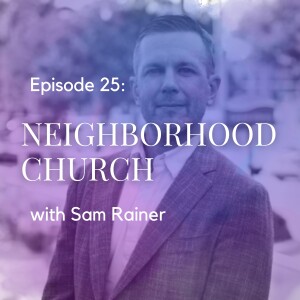
Tuesday Jan 07, 2025
Tuesday Jan 07, 2025
In this episode of the Last Service Podcast, Matt welcomes Sam Rainer, pastor, church consultant, and president of Church Answers, for a candid discussion about the state of the American church. Together, they explore the challenges facing congregations today, from declining membership to generational shifts in engagement. Sam shares actionable insights on how churches can revitalize, stay relevant, and impact their local communities. Whether you're a pastor, church leader, or member, this episode is packed with wisdom to inspire and guide your ministry.
Key Takeaways:
Community-Centered Ministry: Churches thrive when they shift focus from attracting crowds to deeply engaging their local neighborhoods.
Opportunities for Mid-Sized Churches: With the decline of the mega-church movement, mid-sized churches hold untapped potential for growth and generational outreach.
Breaking the Decline Cycle: Strategic reinvention, mergers, and prioritizing multi-ethnic ministry can help churches overcome decline and build a sustainable future.
Topics Discussed:
Sam’s personal journey from business to ministry
The purpose and tools offered by Church Answers
Key challenges facing American evangelical churches today
The rise of Gen Z’s religious commitment and its implications for church leadership
The importance of multi-ethnic ministry in a changing demographic landscape
Strategies for mid-sized churches to grow and serve their communities
How to navigate the end of a church lifecycle with grace and kingdom purpose
Quotes from the Episode:
“The church is not a destination for crowds; it’s a vehicle to go to your neighborhood and the nations.” – Sam Rainer
“You can grow a church so inward that it dies. The Great Commission must always be at the forefront.”
“Breaking the church lifecycle requires intentional renewal and reinvention, one step at a time.”
Resources Mentioned:
Church Answers – Tools, coaching, and resources for church revitalization and growth
Graphs About Religion by Ryan Burge – Website
The Surprising Return of the Neighborhood Church by Sam Rainer
Connect with Us:
Visit our website for more episodes and resources: lastservicepodcast.com
Rate & Review:If you enjoyed this episode, please leave a review on Apple Podcasts or your favorite podcast platform. Your feedback helps us reach more listeners!
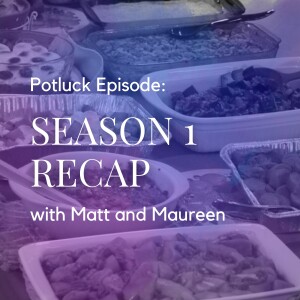
Tuesday Dec 24, 2024
Tuesday Dec 24, 2024
🎙️ Episode HighlightsIn this special recap episode, host [Matt] reflects on the journey through Season 1 of The Last Service Podcast. Joined by his wife, Maureen, they dive into the heart of the podcast’s mission—exploring church closures, transitions, and the faithful endings that can lead to new beginnings.
✨ Key Topics Covered:
Season Favorites:
Episode 5: The heartfelt story of Rehoboth Presbyterian in Atlanta.
Conversations with churchrealty.com's John Muzyka on the pastoral care side of realty.
Insights from Bob Smeitana and Mark Elsdon on church decline in America.
Legal knowledge from Erika Cole and the Good Friday Collaborative episodes.
Lessons Learned:
The role of pastoral care in closures.
How demographic and cultural shifts impact churches.
The importance of self-awareness and community support in navigating change.
Personal Reflections:
Matt shares insights from guiding a non-profit closure and the power of intentional endings.
Key takeaways: "Thank you, I love you, I’m sorry, I forgive you."
💡 Why ListenWhether you’re navigating a church transition, a non-profit leader, or simply curious about the dynamics of faithful endings, this recap offers wisdom, encouragement, and practical advice.
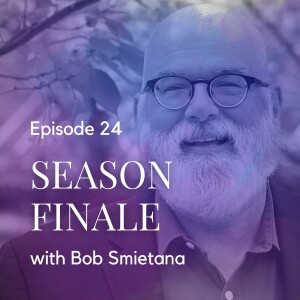
Tuesday Nov 26, 2024
Tuesday Nov 26, 2024
In this powerful season finale, Matt sits down with the legendary religion news reporter and author Bob Smietana to explore the pressing realities facing churches today. From demographic shifts to the challenges of revitalization, Bob shares insights from his acclaimed book, Reorganized Religion, and personal experiences with church closures. This episode is packed with heartfelt stories, actionable insights, and a message of hope for communities navigating change.
Key Topics Covered:
The decline of church attendance: What's driving the numbers?
Demographic and cultural changes impacting church vitality.
Stories of resilience: Churches finding new purposes through partnerships and creativity.
When it's time to close: The emotional and practical realities.
Bob’s personal reflections on his own church's closure.
Highlights You Won’t Want to Miss:
[5:15] Why the American church boom of the mid-20th century is over.
[15:50] The “Walmart effect” of church consolidation and its impact on smaller congregations.
[28:30] What makes a “good ending” for a church, and how planning ahead can make all the difference.
[35:40] Heartwarming stories of community and music from Bob’s former church.
[46:10] How one pastor helped his congregation embrace closure with dignity.
3 Key Takeaways:
1. churches are closing mainly due to changes in demographics and society. What worked to grow churches in prior decades no longer works, and it is often difficult for churches with older buildings to adapt to a new environment.
2. It's better when a church's building, property, and assets stay connected to the mission when transferring ownership.
3. Bob reports on and has written about many churches that have closed. When he and his wife experienced a closing with the congregation they cared about, they experienced a sense of loss and grief. But they also felt sent forth by a community that helped shape their lives. Maybe a church can still be about sending long after it has stopped being able to bring people into a building.
Resources Mentioned:
Reorganized Religion: The Reshaping of the American Church and Why it Matters by Bob Smietana
The Great Dechurching: Who’s Leaving, Why Are They Going, and What Will It Take to Bring Them Back? by Jim Davis
The Good Friday Collabrative's 5 Stages of Church Closure
Share this episode with friends and fellow churchgoers to spark meaningful conversations about the future of faith communities.
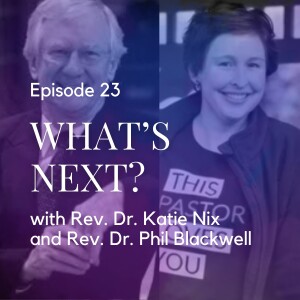
Tuesday Nov 12, 2024
Tuesday Nov 12, 2024
In this episode of The Last Service Podcast, Matt dives into a conversation with Reverend Dr. Katie Nix and Reverend Dr. Phil Blackwell, pastors who led two congregations through a unique journey of merger and renewal. They share the incredible challenges and blessings of bringing together two legacy churches into a unified, mission-focused community. This merger took place amidst the complexities of the pandemic, highlighting the resilience, adaptability, and faith that fueled their journey.
Dr. Nix and Dr. Blackwell explore what they learned in this process, from honoring each congregation's history to forging a shared vision for the future. They discuss practical insights into measuring success beyond traditional metrics, fostering a welcoming environment, and asking questions that prompt creative, forward-thinking ministry. Their story offers inspiring takeaways for church leaders, members, and anyone invested in the future of faith communities.
Key Takeaways:
Embrace Legacy with Purpose – The success of University and Grace UMC's merger hinged on respecting the legacies of each congregation while building a unified identity that serves both past and future communities.
Measure Success Beyond Numbers – Traditional metrics like attendance are important but don't paint the whole picture; focus also on creating spaces for spiritual growth, and meaningful community impact.
Ask Courageous Questions for Renewal – Continuously revisit your church's mission and ask, "What is God calling us to do next?" Embracing imagination and openness can reveal new paths for ministry and outreach.
Listen to The Doctors are In and the story of Grace UMC's merger with University UMC here:
https://podcasts.apple.com/us/podcast/the-doctors-are-in/id1706168185
https://podcasters.spotify.com/pod/show/kathryn-nix/episodes/The-Doctors-Are-In--S3-E2-A-Pastors-Perspective-on-Our-Church-Merger-e2q3mt6
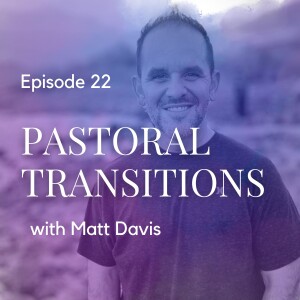
Tuesday Oct 29, 2024
Tuesday Oct 29, 2024
In this episode of The Last Service Podcast, we dive into the profound journey of pastoral transitions with Matt Davis, host of the Life After Ministry Podcast. Matt shares his personal experiences of stepping away from ministry after a moral failure and navigating life outside the church. This episode explores the emotional and logistical challenges pastors face when leaving a church and provides guidance on managing these transitions with grace and support. Davis's story is a testament to resilience and purpose, reminding us that even in difficult seasons, there is potential for growth and reorientation.
Key Takeaways:
Creating Compassionate Exits – Matt emphasizes that churches must prioritize compassion and dignity during pastoral exits, advocating for "kingdom outplacement." By offering structured support like coaching, counseling, and resume assistance, churches can model Christ-like love and compassion in difficult seasons.
Provide Financial and Emotional Support – Financial insecurity frequently accompanies pastoral exits, leaving pastors in challenging positions when they are let go or the church closes. Be generous with severance and communicate with compassion.
The value of third party help - Difficult transitions for pastors or congregations at the end of their life can benefit from third party wisdom and guidance. Bringing in a third party, like Pastoral Transitions, demonstrates a commitment to all people involved and a determination to end well.
Additional Topics Covered:
The spiritual struggle pastors face in redefining their sense of calling
How structured transitions can contribute to healthier, more unified churches
Insights on how churches can foster transparency and support during challenging pastoral changes
Resources:
www.pastoraltransitions.com
Life After Ministry Podcast
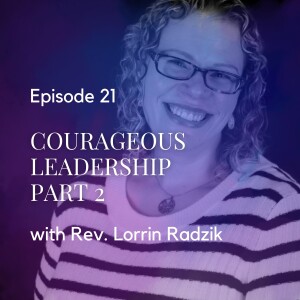
Saturday Oct 19, 2024
Saturday Oct 19, 2024
In this powerful episode of The Last Service Podcast, Matt continues his conversation with Reverend Lorrin Radzik as they explore the complexities of church closures. Lorrin shares her personal journey of closing multiple churches and the unique challenges faced when congregations are forced to confront their own mortality. Together, they dive into how pastors can lead through difficult decisions, the role of a daycare ministry, and the emotional toll of these transitions. Yet amidst the grief, Lorrin uncovers the hopeful message of resurrection within the church’s final days.
Listeners will be inspired by the candid discussion of what it means to lead faithfully, even when the end is near, and how to embrace new beginnings in unexpected places.
Key Takeaways:
Resurrection Beyond Closure: Lorrin explains that even when churches close, their ministry can live on through community connections, spiritual legacies, and even new congregations inhabiting former spaces.
The Emotional Toll of Church Decline: The episode explores the grief and anger that often accompany church closures, highlighting the resilience required of pastors to navigate these emotional waters with compassion and courage.
Reframing Success: Church closure doesn’t mean failure. Matt and Lorrin discuss how honoring a church’s history and legacy can help members find peace in knowing they fulfilled their mission.
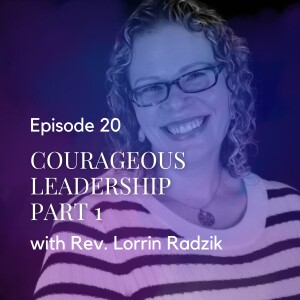
Tuesday Oct 01, 2024
Tuesday Oct 01, 2024
In this raw and insightful episode, Matt sits down with Rev. Lorrin Radzik, a United Methodist pastor with a powerful story of navigating the complexities of ministry, church closure, and personal growth. Lorrin shares her experience leading a struggling congregation in Wisconsin, where she guided the church through the challenging decision to close after decades of decline. Her journey, filled with difficult conversations, resilience, and ultimate closure, offers deep insights into the reality of pastoral leadership and church vitality.
Key Takeaways:
The Impact on PastorsLorrin was placed in an impossible situation with unrealistic expectations at an early and critical time in her career. At times, she questioned her calling and ability. Young pastors rarely reverse the outcome of a dying church. Search committees and denominational officials must consider the long-term impact on a young minister's career when placed in a declining church, or at least be straightforward about the church's history and stage of life.
Leading with Transparency and CourageThroughout the process, Lorrin demonstrated the importance of being honest with congregants about the church's future, even when it was difficult. Her story highlights the necessity of courageous leadership, especially in times of crisis. Lorrin confronted denial and anger in her congregation while still recognizing their faithfulness.
Closure as a Faithful DecisionWhile closing a church might seem like a failure, Lorrin reframes it as an act of faithfulness. She emphasizes that sometimes, the most faithful thing a church can do is to close, passing its legacy and resources on to a new community for future ministry.
Resources:
http://www.revlorrinradzik.com/
https://www.goodfridaycollaborative.com/
https://nationalhmongcaucusumc.weebly.com/

Tuesday Sep 17, 2024
Tuesday Sep 17, 2024
In this compelling episode of The Last Service Podcast, host Matt interviews Dave Meserve, an experienced transitional pastor who has guided multiple churches through the difficult process of closing. Dave shares powerful stories and invaluable insights on how to approach church closures with compassion, wisdom, and a focus on spiritual health.
Key Points:
Dave's unique journey from traditional ministry to becoming a "pastor at large" and transitional leader
The importance of addressing "faith ceilings" and allowing for spiritual growth in church leadership
Detailed accounts of two non-denominational church closures Dave facilitated
The critical role of trust-building and transparent communication during church transitions
How to create meaningful closing ceremonies that honor a church's history and provide closure
The significance of "staying for the benediction" - finding blessing in the ending process
Insights on matching pastoral leadership styles to church size and growth goals
The value of diverse leadership teams, including both men and women
Understanding churches as relationships with natural lifespans
Quotes: "Don't leave before the benediction - there's a blessing if you stay to the end." - Dave Meserve "Churches have lifespans. They have beginnings, long middles we hope, and ends." - Dave Meserve
Keywords: church closure, transitional pastor, faith ceiling, non-denominational churches, church leadership, pastoral care, church ceremonies, spiritual health, church size dynamics, diverse leadership, church lifespan
This episode offers essential guidance for church leaders, pastors, and congregants facing potential church closures or significant transitions. Dave Meserve's experiences provide a roadmap for approaching these challenging situations with grace, intentionality, and a focus on long-term spiritual wellbeing.

Tuesday Sep 03, 2024
Tuesday Sep 03, 2024
In this episode, host Matt interviews Gail Cafferata, author of "The Last Pastor" and a retired Episcopal priest who closed a church. Gail shares her personal experience closing a congregation and insights from her research surveying over 100 pastors who have gone through church closures.
Key topics discussed:- Gail's background as a medical sociologist and Episcopal priest- The emotional and career toll of closing a church on pastors- How sailing metaphors can help understand church leadership - The importance of "differentiation" for pastors leading dying churches- Ways congregations and denominations can support pastors through closure- What constitutes a "good death" for a congregation
3 Key Takeaways:
1. Closing a church takes a significant emotional and career toll on pastors, with many experiencing stress, isolation, and difficulty finding new positions afterward.
2. "Differentiation" - maintaining healthy boundaries between oneself and the congregation - is crucial for pastors leading churches through closure.
3. A "good death" for a church involves celebrating its legacy, providing pastoral care, and empowering members to continue ministry elsewhere.
This episode provides valuable insights for pastors, church leaders, and anyone interested in the challenges facing declining congregations in America today.

Tuesday Aug 20, 2024
Tuesday Aug 20, 2024
In this episode, we sit down with Mike Sares, director of Urban Skye, to discuss their unique approach to ministry outside traditional church structures. Mike shares insights from his extensive experience, including pastoring Scum of the Earth Church and working with various faith entrepreneurs.
Key points covered:
• Urban Skye acts as an umbrella organization for freelance pastors, providing administrative support and spiritual community• Their model draws inspiration from St. Patrick's missionary approach of engaging culture• Mike discusses the importance of relationship-building and entering people's worlds rather than expecting them to enter the church's world• Urban Skye supports a wide variety of ministries, from prison outreach to counseling for missionaries to creative arts programs• The organization emphasizes experimentation and allows for failure as part of the growth process• Mike shares thoughts on how declining churches can learn from Urban Skye's flexible, relationship-focused approach
Mike provides a refreshing perspective on doing ministry in today's cultural landscape, emphasizing authenticity, humility, and a willingness to color outside the lines of traditional church structures. His insights are valuable for pastors, church leaders, and anyone interested in innovative approaches to faith and community.
3 Key Takeaways:
1. Effective ministry often happens outside church walls, meeting people where they are culturally and spiritually.2. Embracing failure and experimentation is crucial for spiritual growth and innovative ministry.3. Declining churches can benefit from focusing on relationships and being willing to change their approaches drastically.
Resources:
https://www.urbanskye.org/
https://www.mikesares.com/
Pure Scum by Mike Sares
https://scumoftheearth.net/
https://www.fiveironfrenzy.com/








